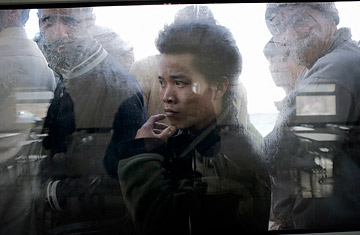
Foreign workers wait in queues in Benghazi, Libya, on Saturday, Feb. 26, hoping to evacuate the country
(2 of 2)
The day's latest arrivals stand in queues beneath a blustery sky as volunteers take their names and assign them to rooms. A group of Thais working for the South Korean company Unicon are hopeful that they'll make it out on the next set of Turkish evacuation boats. "The Thai and Turkish embassies are talking," says Pranomtjan Phiuluang, one of the Thai workers. Carrying a list he compiled of all his fellow citizens at the port, he hoped they'd be leaving the same day.
Shebany is most concerned about the workers who don't have an exit strategy: men like Aziz from Liberia, whose governments don't seem to have any game plan at all. In a stuffy row of offices by the water, Vietnamese workers from the Turkish construction company Tekfen have been waiting anxiously for four days. After traveling north from al-Kufrah, their Turkish managers abandoned them here. "There is not enough food. I am very hungry right now," says Nguyen Van Thuong, 22, a laborer.
Out in the rain, by the Anek Lines cruise ships, many of the Bangladeshis say their situation is far worse: most have only copies of their passports, because their Chinese managers confiscated the real ones when they arrived months ago to work on a housing project. "We want to go back to Bangladesh," says Amir Hussein, as rain begins to soak his clothes. "But we don't know where our passports are."
"Our company — Chinese and Bangladeshi workers — came together to the port yesterday," he adds. "Then the Chinese went back to China and left us here. My wife and sons [back home] are all worried."
In particular, the volunteers say they're worried about the African laborers, who have been scapegoated by both the Gaddafi regime and the antigovernment protesters. "We are afraid people will attack the Africans," says Shebany. He blames Gaddafi, who, like his ousted Egyptian counterpart Hosni Mubarak, has cast much of blame for his country's turmoil on foreign influences. "Today I spoke to the Ghanaian ambassador and asked them what they're going to do. He said, 'I don't know.' "
Shebany says about 250 Africans arrived at the Shehada Jazeera School this morning. But in the lobby, where a Libyan volunteer is taking names on a piece of paper, others put the total seeking refuge here at around a thousand. Many of the West African workers got caught in the cross fire; some were mugged or attacked while making their escape from nearby towns, as opposition protesters accused them of working for the regime. Rashid Mohamed and about 40 Ghanaian colleagues hid in a building at their Turkish construction company's project site for eight days, rationing bread as fighting raged around them, with their sleeping quarters — along with their passports and belongings — burned. "They said that Gaddafi brought the black people to fight," he says. "So the Libyans, when they see the blacks, they will kill them."
Even in the relative safety of the school hallways Mohamed and the others, clad in thin jackets and clutching small suitcases, are anxious. "We need help from our President in Ghana. We need serious help," says Kuko Oppong, a Ghanaian worker, who adds that he would welcome the United Nations too. "If they don't help us, some people might die. It's a bad situation. They're shooting guns."
Indeed, even as more Ghanaian and Nigerian arrivals wait in the school's muddy courtyard, the Libyan volunteers taking care of them fret that they may have to relocate the group soon. Wadir Jadir says they have gotten messages from people in the neighborhood and may move the workers to a nearby stadium. "People in the neighborhood don't want them here," he says. Residents accuse them of being mercenaries for Gaddafi. "And if they go out, some people might kill them."
